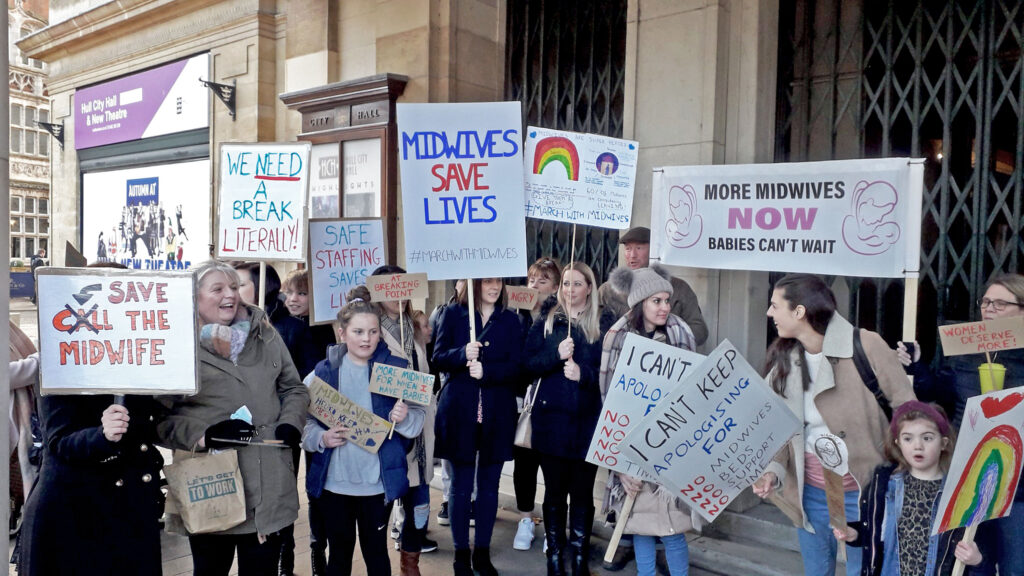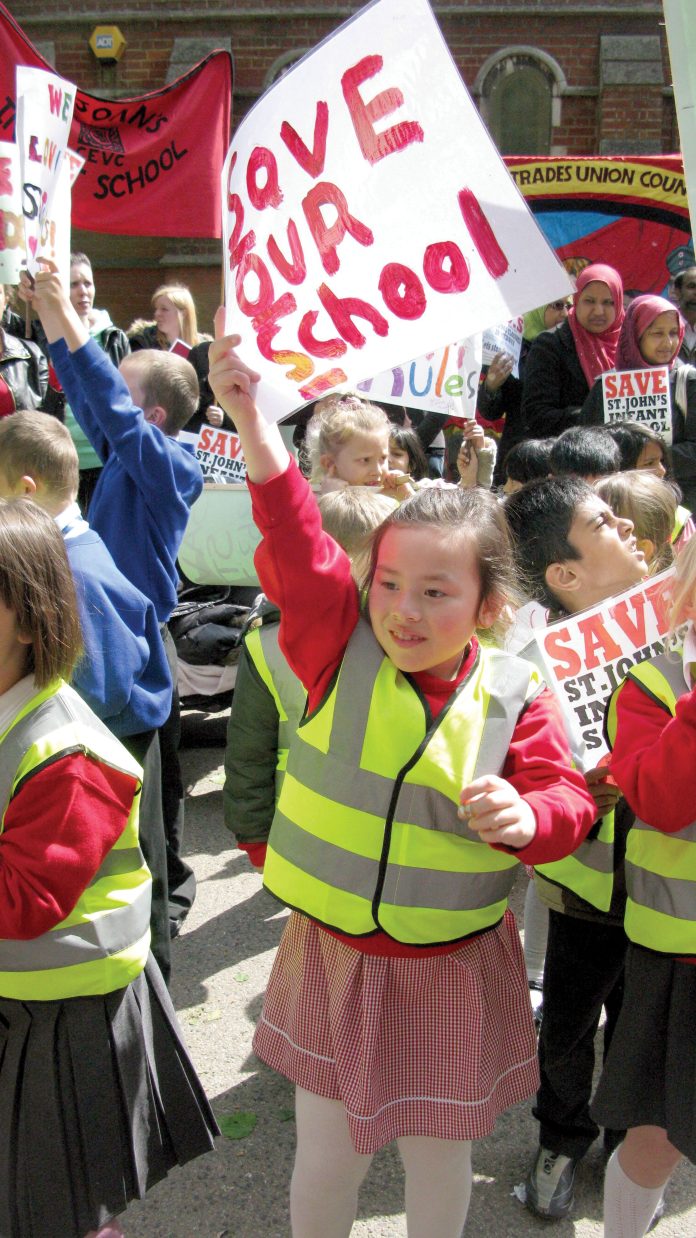Bea Gardner, Enfield and Lea Valley Socialist Party
Parents are confronted with the seemingly impossible balancing act of trying to earn enough to support a family, while still having time to spend with our children.
Low pay and insecure work, extortionate rent and other living costs already put huge pressure on workers, and having children increases the strain.
Before the development of the present cost-of-living crisis, in-work poverty was already rising, driven in large part by increasing poverty among working parents, according to the Joseph Rowntree Foundation. Outrageously, more than half of people in poverty in the UK live in a family where at least one person is in paid work.
Extortionate childcare costs mean there is often no financial benefit in returning to work, especially if you add to that the cost of a commute. The absence of genuine living wages increases pressure to work long hours and multiple jobs.
Many new parents I know are confronting the reality that maternity leave is not long enough and they face extremely limited options when returning to work. Our own decision on when to become parents was based on an attempt to calculate when would leave us less impoverished. If our baby was born a month later I would have had no entitlement to maternity pay as my fixed-term post would have ended.
Maternity pay and maternity allowances nowhere near cover monthly expenses. For example, the maternity allowance I receive doesn’t even cover rent on our one-bedroom flat.
Statutory maternity and paternity pay is supposed to be a legal minimum that those taking leave on the birth of their baby are entitled to. In reality is often the maximum. The current rate is 90% of earnings, or £156.66 a week – whichever is lower. The right to a year’s maternity leave means nothing if you can’t afford to actually take it!
Insecurity
Meanwhile, high rates of insecure and ‘gig economy’ jobs mean many aren’t even eligible for Statutory Maternity or Paternity Pay, instead relying on Universal Credit or maternity allowance paid for by the government, letting employers off the hook for any financial responsibility at all.
All workers have the right to apply for flexible working, something that is necessary for many parents balancing childcare responsibilities. But employers aren’t obliged to actually grant it.
My baby group conversations are dominated by women calculating whether it is financially worthwhile to return to work and on what basis. Many are opting to work reduced hours while relying on unpaid childcare from friends and relatives.
However, they are told they can only reduce hours it they can demonstrate that there will be no impact on their work. In other words, guaranteeing they will do the same work in fewer hours for less pay!
45% of working mums (and 10% of Dads) have quit a job after having requests for flexible working turned down.
Parents, especially women, do face discrimination from employers who fear it might be harder to force extra hours onto, or squeeze unpaid work from, workers with children. It is necessary for trade unions in workplaces to stand up to any individual instances of discrimination.
But the measures needed to transform parents’ lives are ones which will benefit all workers. These include a £15-an-hour minimum wage, pay rises that keep up with or outstrip the rising cost of living, access to genuine flexible working and a four-day week without loss of pay, and an extension and increase in parental leave and pay. These are demands that the trade unions must struggle for.
Childcare: privatised, unaffordable and unfit for purpose

Ryan Aldred, Plymouth Socialist Party
Our system, if you can even call it that, is completely broken and unfit for purpose.
When my partner’s maternity leave ran out and she had to go back to work, we were thrust into a dilemma: how the hell are we going to pay for childcare? For a few months we just about muddled by, organising separate days off from work, barely seeing each other and relying on the grandparents to cover.
That just about worked for us, but not everybody is in this position. It’s a problem that nobody should have to deal with in the first place.
When it was clear that it was exhausting the grandparents, we sought childcare. With very little in the way of support available from the government, we had to self-fund. We managed to organise for two days at a private nursery (there are no local authority facilities) with a further day with a child-minder.
This cost us around £500 a month, which meant we lost around one-third of our household income just to be available to work. We were just about better off with both of us working.
We’ve had to wait until our daughter turned three before getting proper support for childcare as we weren’t eligible for the support when our daughter turned two. What the government thinks happens until a child turns two with two working parents is beyond baffling! At three, you’re entitled to 30 hours childcare, but only if you’re both expecting to earn over £1,976 in three months – 16 hours a week at the national living wage for over 23s.
What are you supposed to do if you’re in a low-income job or if you’re on insecure and inconsistent hours? If you don’t earn over this threshold then you’re left with only 15 hours a week. Also, you still have to pay for nappies and meals which most private childcare providers will offer but at extra cost.
We need a fundamental overhaul of the system because it doesn’t work. We need free, public, quality childcare provided from birth all the way up to school age. Not just to free us up to work, but also to give us the opportunity for a breather from what is an infinitely rewarding but nevertheless exhausting job of parenting.
Unless the next generation collectively plans to have no children, this is going to remain a burning issue which requires a properly planned solution.

Parents and children let down by underfunded health services
Tanis Belsham-Wray, Leeds Socialist Party
The infant mortality rate in the UK has been increasing since 2014, according to the Office for National Statistics, growing more in the poorest areas. Pregnant women are twice as likely to die if they live in the most deprived areas, and black women are four times more likely to die.
The UK is short of over 2,000 midwives, and this number continues to grow as more midwives leave. In the year to February 2022, there was a net fall of 458 midwives according to the Royal College of Midwives.
If anyone has visited an early pregnancy unit over the past few years it wouldn’t be surprising to see women crowded into waiting rooms, often waiting several hours, even days, before finding out if their foetus or baby is healthy or alive. During the pandemic, much of this will have been done without the support of family or friends not allowed to attend appointments.
The damning Ockenden review into maternity deaths in Shropshire exposes the consequences of underfunded services in an NHS, run in a top-down bureaucratic manner, employing stressed and underpaid staff. Conditions that have led to grassroots ‘March with Midwives’ protests developing.
Post-pregnancy, health services aren’t much better. Half of mothers with a child under six months during the first lockdown met the threshold for postnatal depression, double the usual rate. Much of the time this is mistakenly put down to ‘baby blues’ hormone changes, delaying treatment. Around one-in-ten fathers also suffer from postnatal depression.
Instances of postnatal depression are made worse by the lack of services made available to parents postpartum. The frequency of visits from health visitors and midwives has been reduced by cuts and privatisation, as has access to children’s centres. Babies health conditions are left undiagnosed, and waiting lists for treatments for conditions such as tongue tie continue to grow.
Proper investment into the NHS across the board is needed to meet the needs of parents and children, not simply more targets. A decent pay rise for NHS staff, linked to a mass recruitment drive to fill the over 100,000 NHS vacancies, needs to be fought for.
Build a movement to end capitalist-fuelled crisis
The financial cost of raising a child to the age of 18 has risen to £152,747 for a couple, £185,413 for a lone parent, according to the Child Poverty Action Group. The cost-of-living crisis bites hard for parents and children.
Already facing increasing childcare costs, and with services devastated by cuts and closures, the Covid-19 pandemic exacerbated financial insecurity, limited access to services and increased isolation. Parents of school-age children faced the prospect of home-schooling, and having to take time off work to look after children forced to isolate. Mothers gave birth, attended scans or were informed of miscarriage alone, without co-parents or other support.
Instances of postnatal depression in new mothers doubled through the first Covid lockdown, and increased for fathers too. Social isolation of parents, largely women, who tend to take on the majority of childcare responsibilities, increased, as it did for many workers asked to work from home. The problems of everyday life – the challenges to feed, clothe and look after family members – fell even more to individual family units, particularly women, without the support of extended family or other networks.
For the capitalist class, the necessary task of raising future generations of workers is preferably done in the home, at no cost to them, leaving profits intact.
In the post war boom some concessions were won to ease the domestic burden on women by establishing council-run nurseries, albeit on a limited basis, and extending maternity rights.
But in periods of economic crisis, these limited reforms have been clawed back by the capitalist class. Today, capitalism faces a new, deepening crisis, and with it worker shortages and childcare in crisis. Many parents are unable to access or afford a childcare place and so remain unable to return to work.
Individual families are increasingly expected to take up the slack, forced into poverty by childcare costs, working extra hours or taking up second and third jobs, and performing domestic tasks late into the evening.
We must fight for the steps needed to ease the burden on families with children. The trade unions, with over six million members, represent the strongest organised force in society, and therefore are best placed to fight for and win gains for workers, including parents and families.
But to do so in the workplace alone leaves the political arena free for the bosses’ politicians and their apologists. For the fight to be most effective, it’s necessary to establish a new mass party of the working class, with the trade unions taking a leading role, and armed with a fighting socialist programme.
A system based on generating profits for a few will continue to drive down living standards for parents, families and the working class as a whole. That’s why we fight for a programme to transform society by taking the big banks and businesses into democratic public ownership, so resources can be planned to meet society’s needs.
We fight for
Childcare & Education
- Free, public, quality and flexible childcare accessible to all, from birth
- Bring nurseries and other childcare facilities back into public ownership
- For parents’, students’ and workers’ democratic control of childcare and education provision and curriculum
- Expand free school meals to all children in all education and childcare settings
- Re-open and extend fully staffed and resourced youth clubs, including with free access to leisure facilities
- No child should pay to get to school, for free public transport
Health and Homes
- Fully fund and staff expanded maternity, paediatric and mental health services as part of a fully funded NHS, staffed by well-paid, well-trained workers
- Reopen Surestart centres and expand provision of children’s centres to offer parenting support including feeding support. Bring privatised services such as health visitors back in-house
- Full, free access to abortion and fertility services
- End overcrowding and unsafe housing. For mass building of council homes with gardens. Introduce rent controls, end landlord’s discrimination against families with children and for those on housing benefit
- Fight for clean air for our children. For investment in green energy and a democratic control over road and industrial developments near our homes
At Work
- For fighting democratic trade unions, union recognition in the workplace, and an end to the anti-trade union laws
- An extension in maternity and paternity leave up to a year
- Full maternity and paternity pay throughout parental leave at a rate of 100% of weekly earnings or 32 hours at national living wage levels, whichever is higher
- For decent benefits that reflect the cost of raising children, rising with the cost of living
- £15-an-hour minimum wage for all with no exemptions
- Flexible working – on the workers’ terms, with no loss of pay
Socialism
- End the cost-of-living nightmare and take the wealth off the super-rich. Nationalise the top 150 companies and the banks to be run under democratic working-class control and management.
- For a democratic socialist plan of production to meet the needs of the overwhelming majority, not for profit.







